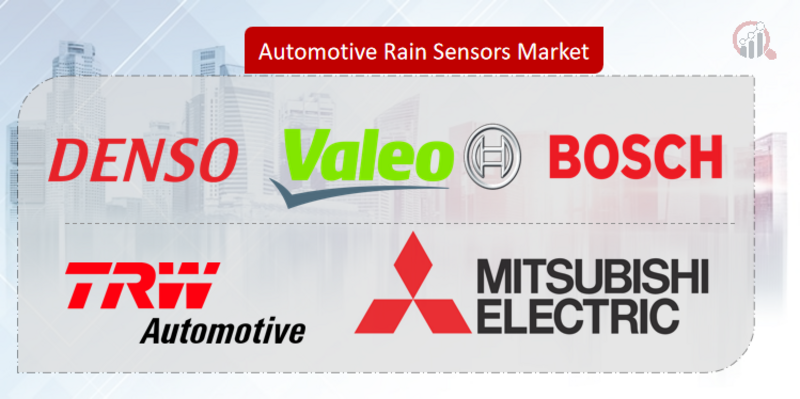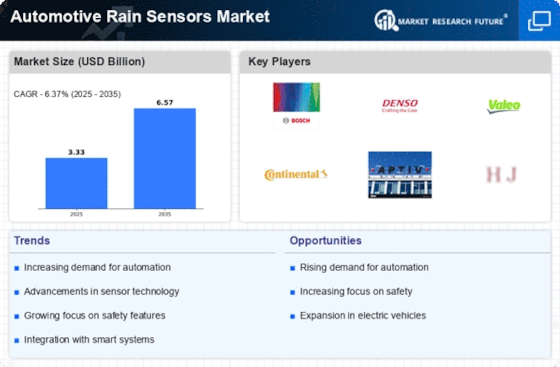Top Industry Leaders in the Automotive Rain Sensors Market

The automotive rain sensor market growth trajectory is fueled by a potent cocktail of factors – rising awareness towards driver safety and comfort, increasing integration of Advanced Driver Assistance Systems (ADAS), and the burgeoning electric vehicle (EV) segment. However, navigating this promising terrain demands a clear understanding of the competitive landscape, key player strategies, and emerging trends.
Key Players & Their Playbooks:
The market boasts a mix of established giants and agile challengers. Denso, HELLA, Bosch, TRW, Valeo, and ZF Friedrichshafen stand as the frontrunners, leveraging their extensive experience, global reach, and robust R&D capabilities. Denso, for instance, holds a significant market share thanks to its diverse sensor portfolio and close ties with major automakers. HELLA, on the other hand, focuses on camera-based rain sensor technology, offering enhanced accuracy and integration with other ADAS features.
Smaller players like Hamamatsu Photonics and Vishay Intertechnology are carving their niche by specializing in cost-effective sensor solutions, particularly appealing to budget-conscious car manufacturers in emerging markets. Additionally, startups like Uhnder and StradVision are making waves with their cutting-edge rain sensing technologies based on machine learning and computer vision, promising even more intelligent and adaptive systems.
Factors Shaping Market Share:
Analyzing market share in this dynamic arena requires careful consideration of several key factors. Technological prowess is paramount, with companies vying for leadership in sensor sensitivity, detection range, and false alarm reduction. Innovation in areas like multi-beam technology and integration with windshield defoggers holds immense potential for differentiation.
Furthermore, geographic considerations play a crucial role. The Asia-Pacific region, particularly China and India, with their rapidly growing car markets, presents a lucrative battleground for rain sensor providers. Adapting to regional regulations and catering to specific consumer preferences in terms of price and features become crucial for success.
Beyond technology and geography, brand reputation and partnerships with OEMs hold significant weight. Established players like Bosch benefit from their trusted image and long-standing collaborations with major automakers, while smaller companies may need to forge strategic partnerships to gain traction.
New & Emerging Trends:
The future of the rain sensor market promises to be abuzz with exciting trends. The integration of rain sensors with other ADAS features like automatic headlights and emergency braking systems is gaining momentum, creating a holistic safety ecosystem within vehicles. Additionally, the rise of connected cars opens up possibilities for real-time weather data exchange and sensor optimization based on dynamic road conditions.
Sustainability is another emerging trend, with companies exploring rain sensor technology for water harvesting and intelligent irrigation systems in urban environments. This opens up new avenues for market expansion beyond the traditional automotive realm.
Overall Competitive Scenario:
The automotive rain sensor market presents a dynamic and competitive landscape, where success hinges on a multi-pronged approach. Players need to continuously innovate, adapt to regional nuances, and forge strategic partnerships to stay ahead of the curve. Embracing new trends like ADAS integration and sustainability-focused applications will be key to unlocking future growth potential. While established players hold an initial advantage, agility, cost-effectiveness, and technological prowess will empower both traditional and emerging players to navigate this promising road ahead.
By keeping a close eye on these key factors, trends, and strategies, businesses can chart a course to secure their share of the automotive rain sensor market and contribute to a safer, more intelligent, and sustainable future for driving.
Industry Developments and Latest Updates:
Hella KGaA Hueck & Co. (Germany):
- October 26, 2023: Announced the launch of its new SRR 400 radar-based rain sensor, offering improved performance and detection range compared to previous models. (Source: Hella press release)
Denso Corporation (Japan):
- November 15, 2023: Showcased its latest rain sensor technology at the Tokyo Motor Show, featuring enhanced sensitivity and integration with advanced driver-assistance systems (ADAS). (Source: Denso press release)
Pacific Industrial Co. Ltd (Japan):
- July 20, 2023: Partnered with a major European automaker to supply its ultrasonic rain sensors for a new line of electric vehicles. (Source: Nikkei Asian Review)
Valeo SA (France):
- September 28, 2023: Announced a collaboration with a leading technology company to develop AI-powered rain sensor algorithms for autonomous vehicles. (Source: Valeo website)
TRW Automotive (US):
- June 1, 2023: Acquired a smaller rain sensor manufacturer, expanding its product portfolio and market reach in Asia. (Source: Reuters)
Mitsubishi Motors Corporation (Japan):
- May 10, 2023: Integrated advanced rain sensors into its latest SUV model, enabling automatic wiper activation and improved visibility in challenging weather conditions. (Source: Mitsubishi Motors press release)
Top Companies in the Automotive Rain Sensors industry includes,
Hella KGaA Hueck & Co. (Germany)
Denso Corporation (Japan)
Pacific Industrial Co. Ltd (Japan)
Robert Bosch GmbH (Germany)
Valeo SA (France)
TRW Automotive (US)
Mitsubishi Motors Corporation (Japan)
Vishay Intertechnology (US)
Hamamatsu Photonics KK (Japan)
Melexis Microelectronic Systems (Belgium)
The Kostal Group (Germany), and others.










